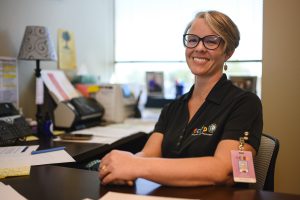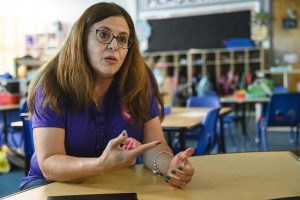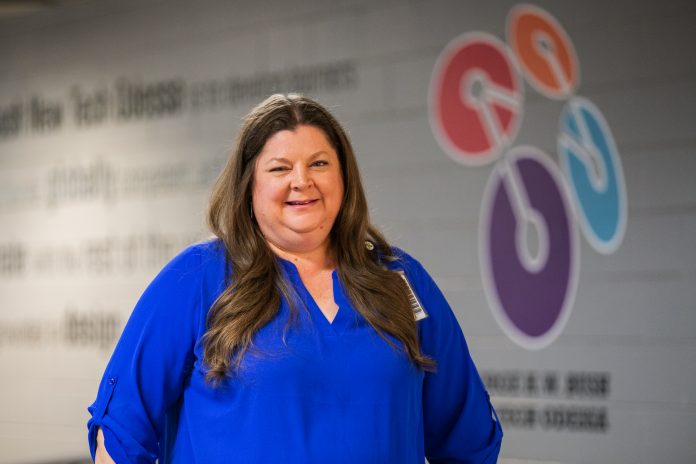While the process has been rigorous, three of Ector County ISD’s teachers in the National Board for Professional Teacher Standards certification program are glad they challenged it and can already see the benefits.
Vanessa Brower, a gifted and talented teacher at LBJ Elementary, Annie Arredondo, a secondary ESL specialist, and Deborah Pina, a prekindergarten teacher at Hays STEAM Academy, are in various stages of certification, but they have one thing in common: If you put a goal in front of them, they go after it head on.
ECISD currently has 46 teachers in the National Board certification program. Informational meetings for Cohort 3 will begin the end of June and more than 80 teachers have shown interest in it.
The district partnered with the Permian Strategic Partnership (PSP) to pay for teachers to pursue National Board for Professional Teacher Standards certification, which improves teacher quality and pays a stipend.
The next informational meeting is at 9 a.m. June 8 in Conference Room E at the Administration Building.
The founding mission of the National Board is to advance the quality of teaching and learning by:
>> Maintaining high and rigorous standards for what accomplished teachers should know and be able to do.
>> Providing a national voluntary system certifying teachers who meet these standards; and advocating related education reforms to integrate National Board Certification into American education and to capitalize on the expertise of National Board Certified Teachers.
Recognized as the “gold standard” in teacher certification, the National Board believes higher standards for teachers means better learning for students, ECISD National Board Certification Coordinator Kelly Stansell said in an email.
Brower at LBJ said she feels that teachers in her department are at a level that would already qualify for National Board.
“… We’re reflective in our practice and we have an intimate knowledge of our students, as far as understanding where they come from … their family life. … I have students from first grade through fifth grade, so by the time they’ve moved up through my classes, I get to know their families really well. It’s something that I think is a unique perspective and it helps me to be a better teacher to be able to stay with them for that long,” Brower said.
“I just felt like National Board was … a way, to show what I know and show what I can do. I really feel like it has been the best decision for me as an educator to pursue that,” Brower added.
She was set to finish all four of her components by May 15. However, she won’t get her score until Dec. 8. She also wanted to retake one part of the test for component one just to do her best.
“The process was intense. We came into it sort of in the middle of the year last year. I think our first meeting was in January or February and the rest of the people that were in the program had been in since … August or September,” Brower said.
They meet weekly with their cohort, walk through their specializations and talk about how to fill out the forms and how to write. Writing for National Board is more analysis of what you do, why you do it and examples of how you accomplish distinguished teaching, she said.
“… It’s very, almost formulaic, but … you’re showing what you’re doing. You’re not just writing a story (in) flowery language. It has to be very direct, almost cold, but it really makes you hone in on what are your results,” Brower said.
It prompts teachers to ask if they are effective as teachers, is their daily practice appropriate, where do they need to improve as an educator. She added that it’s very eye-opening.
“… I really think every teacher should at least go through the process, because it really does bring out the truth about your teaching. I appreciate the opportunity to be able to do that. That’s something that I kind of tried to do anyway as a teacher, just because I want to be at my best for my students. …,” Brower said.
The certification process has helped her realize what she’s capable of. She’s also thrilled at the prospect of National Board certification and knowing she can take that anywhere.
Brower is in her 24th year with ECISD, including 21 years in the Gifted and Talented department.
A native of Alpine, Brower grew up in Marathon and graduated from Sanderson High School. Her father was a GT teacher, as well.
She went to Sul Ross State University in Alpine and graduated with her bachelors degree in 1997 and her master’s in 1998.
“I think the thing is, you show me a goal and then you release me and I’ll be there as fast as I can. I’m just one of those people. Like that’s something that in West Texas, you don’t see a lot of people setting goals for each other. You kind of do your own thing, but when somebody puts something in front of me and I know that will help my family, my career, and especially the kids that I work with, I’m there. I’m going to be there as fast as I can,” Brower said.
She and her husband, Tim, a counselor at Odessa High School, have a daughter.
Arredondo said she finished her master’s degree in October and the district offered the opportunity for National Board certification, so she went for it.

“This is the equivalent of a master’s program and the district is paying for it. … The program itself, after I started reading about it, (was) very intriguing because of the way that it talks and describes how teachers look at students. It is not asking you to look at students as a deficit. It’s always positive. It’s Asset Based Thinking …,” Arredondo said.
That mindset allows her to look at her students’ achievements on the positive side, rather than thinking about what they hadn’t mastered yet and what she had to re-teach.
As a secondary ESL specialist, she works only with sixth through 12th grade teachers and students, “mostly newcomers, but any served ESL student.”
“We have assigned campuses, so I work with two middle schools and a high school,” Arredondo said.
Odessa High School, Bonham and Wilson & Young middle schools are the campuses she works with.
“The task with National Board is you have one class, or one group of students, and that’s where you gather your student data from. You give them a pre-assessment, post assessment and you really analyze your work with that group. … I elected to do the high school students because I’ve never taught high school before. I decided I wanted to do this and I wanted to go big,” Arredondo said.
On the upside, she said she picked the students she wanted to work with, but on the downside, she’s not the teacher of record.
“… I was in the classroom three days a week for six weeks building a relationship with those students, that classroom so that you get to know their background, where they’re from, their stories, how they got here, who they live with, what their goals are in life before you can ever teach the unit. It is a lot and then my director is very gracious and she gave me those three hours a week to go to Odessa High and to complete my National Board because she also sees the benefit to increasing my skills with that piece,” Arredondo said.
National Board has different tracks and you get to choose the one you want to pursue.
“National Board is not divided by grade level, or language and to some extent not even by content. You pick an age range and so I am doing ESL 11 years old to 18 plus. I could have chosen any group of students between the ages of 11 to 18 plus. I could have worked with adults. Then you pick, in my case because it’s ESL, I could have worked with a math classroom, a science classroom, because I’m building language. From the administrative part, one of my primary job roles is teacher support and coaching. By going back into the classroom and teaching through this asset-based lens, when I give feedback to teachers, I can help them look at their students differently and think about goals and progress differently …,” Arredondo said.
Being required to write it out in full sentences makes you really think about it, she said.
“In that way, I can help teachers, better coach them to think about their kids as asset based versus deficit,” she said.
“… There are some teachers who are willing to change their view, or at least recognize that the kids have assets and strengths. There have been other teachers who are not interested, and so I don’t push it. It’s not my job to force them …,” she added.
There are some strategies she can offer teachers, but the asset-based viewpoint takes more time.
Arredondo earned a bachelor’s degree in English from kinesiology from University of Texas Permian Basin and a maser’s in English as a second language, also from UTPB.
This is her first year in the National Board process. She will be submitting component two and taking the test for component one.
“We’ll do component three and four next year. National Board tells you can take up to three years and the district is willing to pay for those three years. …,” Arredondo said.
She also won’t get her results until December.
“I think that teachers should do it and I don’t think it should be because of the money. … It helps make you a better teacher. It refines your skills. It makes you think in a different way and it makes you look at students in a different way. And it is my opinion, 100% my opinion, that that is something that our district, our teachers and our students need. There is room for growth in our district and this is an opportunity, an almost 100% free opportunity, for us to change what has not been working in our district,” Arredondo said.
This is her 15th year in education. She started at Hood Junior High, now Wilson & Young teaching as an ESL, seventh, eighth and ninth grade English language arts teacher. She also taught seventh-grade girls athletics. She was then offered her current position and has been in it for nine years.
She moved to Odessa in 1996 from Kaycee, Wyo. She finished her senior year at Odessa High after which she went on to UTPB.
Together, she and her husband, Anthony, have three children and have been married for 18 years. He is a cook at Curbside Bistro.
Like her colleagues, Pina had been thinking about starting her master’s degree.

“… When this opportunity came up, the pay was actually probably going to be more than actually a master’s degree. So I just thought I’ll just try it. If I get accepted, great, and if I don’t then I’ll continue on with my master’s. I got accepted for the first cohort, so I was really excited about that,” Pina said.
This is Pina’s seventh year with ECISD and she has been in education for 21 years. She taught for Midland ISD, a private school, and when her third child was little, she briefly taught at a Mother’s Day Out.
Originally from Andrews, Pina earned a bachelor’s degree in English with an endorsement in early childhood education (prekindergarten 4) from UTPB.
“With National Board, they have different certifications, so I’m actually an early childhood generalist so it would be ages 3 through 8,” Pina said.
The certification is portable, but you do have to re-certify every five years.
“That is another process, but it’s a shorter process than the initial certification,” Pina said.
The process has been “very enlightening.” It brings more self awareness as to how you are teaching.
“For component three, I have to submit two teaching videos so my kids have gotten used to being videotaped. … It’s hard to watch yourself and you think about oh, I should have done this; oh, I should have done (that). So we’ve had lots of videos. It’s a lot of self reflection and that’s part of the process for National Board,” Pina said.
She added that she would also recommend it to other teachers.
“… I think it teaches you a lot about how you teach and encompassing the whole child. I feel like I did have an advantage because I was an early childhood teacher anyway and we do a lot of those components, teaching the whole child on all different levels. That’s what National Board is about …,” Pina said.
Some people are getting certified in art, English, or certified in high school grades, but the standards for National Board are pretty much the same, she said.
Pina is hoping being certified will help her as she moves through her career and she is appreciative of the chance to go for the certification.
“I think being part of the first cohort, we’re kind of leading the charge, so to say, so I’m hoping it will help us throughout,” she added.
She and her husband, Danny, have four children. Three are adults and one 8 and goes to Hays.




